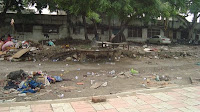
by Anuradha Bakshi | Sep 13, 2010 | commonwealth games, women centre
 Memory is a way of holding on to the things you love, the things you are, the things you never want to lose wrote Kevin Arnold. I was reminded of these words yesterday when I finally mustered the courage to go and see what was left of the homes of my dear Lohar friends. Nothing could have prepared me for what I saw: a desolate stretch of road strewed with the last vestiges of what once was a vibrant and happy place.
Memory is a way of holding on to the things you love, the things you are, the things you never want to lose wrote Kevin Arnold. I was reminded of these words yesterday when I finally mustered the courage to go and see what was left of the homes of my dear Lohar friends. Nothing could have prepared me for what I saw: a desolate stretch of road strewed with the last vestiges of what once was a vibrant and happy place.
I walked along the remnants of over three decades of life of more than thirty families I had learnt to know, love and respect, careful not to tread on anything. You see I was privy to what the scattered plastic bags, the lone table and bed left in a hurry, the bits of cardboard that littered the ground, the broken pot, the bricks actually were. They were what remained of the trials and tribulations of a proud people who had valiantly refused to let go of their heritage. I could not hold the tears that poured unabashedly from my tired eyes. All that lay helter skelter on the ground was also past of 10 years of my own life.
There were things in this almost hallowed ground that I never wanted to lose. I sat on the lone discarded charpoy – rope strung bed – and let memories flood my mind. I remembered the day when I first visited the Lohar camp. I had come to meet the head of the clan in the hope that he would agree to our opening a small class for the children. I did not know what to expect. I was made to sit on a charpoy – was it the one I was sitting on today? – and a few minutes later a diminutive man came and sat next to me and asked me what I wanted. I looked into his eyes and was immediately touched by the gentleness and serenity that emanated from him. He was the tallest small man I had ever met! The rest is history: we began our classes the very next day. There was no real reason for my coming to the camp again but that was not to be. For the next months, years and more I found myself coming back with almost obsessive regularity.
Whenever I had a problem that plagued me or felt under the weather and in need of a shot of optimism, I found myself walking to the Lohar camp and spending time with Tau and his people. Very soon they knew I did not drink fizzy drinks but had my tea black, and before I could even catch my breath a warm syrupy glass of black tea was in my hand. We talked of everything and nothing and got to know and respect each other in no time. I always found answers to my concerns and they shared their angst. And that is how I came to know about their plight and how they had been let down by the authorities. Soon we were ready to file our PIL in Court. I remember the day when the matter came up for admission. I had been too chicken to go to Court and had decided to wait for the outcome at the Camp with Tau. As I paced up and down, Tau came up to me and told me to stop worrying. Had they not waited for 400 years, they would for a few more if need be. I was stunned. How could anyone have such resilience in the wake of so much abuse. I must admit I felt very small.
I remember the day when I had taken Tau to the Habitat Centre for a conference on nomadic tribes. As we walked towards the hall, there was another meet going on. Tau asked me what it was and I told him it was a talk on the existence of God. He looked at me with a bemused smile and said agar hum hain to woh hai, agar hum nahin to woh kahan – if we exist then so does He, and we do not then how can He -. I was speechless. What a beautiful and logical way of resolving the age old debate of God’s existence! Wished Tau could have been a speaker at the very upmarket talk. I could go on about the moments spent with Tau, he puffing on his hookah a benign smile on his wizened face, his eyes filled with tender concern, and me rattling on about my problems which in hindsight seem so inconsequential. He would sometimes say something but most of the times just being able to pour out all my angst was enough to make me come alive.
So many memories crowd my hurting mind as I walk this desolate road. And no just of Tau but of so many others. How can I forget little Ritu, a bonny three year old with a mop of curly hair, a burnt copper complexion and two huge eyes that twinkled all the time. She was our little guide when anyone came visiting. All I had to tell her was to show her house and she would take the person’s hand in her little chubby one and march off in the direction of her home which was the last tent on the far side of the camp. When she reached her tent she would enter it with aplomb and then with an almost regal gesture proclaim yeh hai – this is it – as if she was showing a palace. She would then ask you to sit on the bed and march off looking for her mom. Soon the tent would be full of neighbours and the inevitable bottle of coke would appear from nowhere. Such was the generosity of this proud people.
Then there was Geeta and Sarika our two creche teachers. They were so beautiful that it took your breath away and made you remember all the tales about the beauty of Gypsy women. What never ceased to amaze me was the fact that they and all the other young girls of the camp were always impeccably turned out, their hands and toe nails painted bright and never chipped. Now imagine achieving this when you live on the street with no running water and in the midst of coal dust and car fumes. Quite a feat! But that was not all, each of these waif like women were able to beat iron wielding a hammer so heavy that you would barely be able to lift it off the ground. They did that with such grace that it almost looked like the steps of an intricate ballet. I often looked at my shabby self and wished I too was born with such grace.
As I stepped across a broken chullah – earth stove – I could almost smell the aroma of the hand slapped rotis – bread – that I had so often shared with the ladies. I must admit I was so fond of them that I timed my visits accordingly. But it was not just the rotis that enticed me, but the women themselves as they were true free spirits and it was always a delight to spend time with them. We laughed and giggled as old friends would and I realised that we were so alike. I could go on about my Lohar friends but it hurts too much. Soon the last remains of their lives will be blown by the wind or simply swept away to make the stretch of road worthy of the passing glance of the Commonwealth Games participants’ cavalcade. I wonder how anyone would have been disturbed by the sight of women beating iron or selling their ware, children playing around or wizend men quitely smoking their hookas in the shade. But the powers that are, know better I guess. To me though the Lohars are a tiny bit of India we can truly be proud of and not desperate to hide away.
I miss my friends.
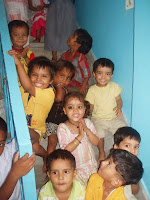
by Anuradha Bakshi | Sep 6, 2010 | manu, okhla, women centre
 Aren’t you too old to take up a new challenge like Planet Why? What difference does your work really make in a country with 1.3 billion? Why should the world care, everyone has got a lot of problems of his own? Do you think you will change the world? These are some of the questions I have been asked to answer for forthcoming interview. As I sat pondering over how I would answer these, I found myself taking stock of what I could best sum up as my life!
Aren’t you too old to take up a new challenge like Planet Why? What difference does your work really make in a country with 1.3 billion? Why should the world care, everyone has got a lot of problems of his own? Do you think you will change the world? These are some of the questions I have been asked to answer for forthcoming interview. As I sat pondering over how I would answer these, I found myself taking stock of what I could best sum up as my life!
If I were to answers these questions with one liners they would go like this: I am old but I do not think I am too old; have you heard of the ripple effect; because we have been given the gift to care; not the world but maybe one life. Anyway I will find the right answers when needed but for the moment I need as I said to review the decade gone by.
Rewind to 2000 and the scorching day in May when I first lay eyes on Manu. Something happened on that day. It was as if I had been shaken out of a long slumber and made to come alive. At that instant it was not the about 1.3 billion people but just one lost soul whose dignity had been usurped and needed to be restored. And hence began the journey many of you know as pwhy! Why should I have cared. I do not know, I only knew that I had no choice. And funnily all my own problems paled and almost vanished. It was not a matter of changing the world but of changing one life, that of Manu. The ball was rolling..
And over the years it has been a saga of trying to make a difference, caring and changing lives and above all knowing that there was no other option. Manu’s morrows needed to be secured and to do that pwhy saw the light of day. From a small spoken English class of 40 to a family of over 700 it was all a matter of making a difference and changing lives.
Fast forward to 2010. Let me tell you what we look like today. Manu now lives in his own home, sleeps in a bed and not on the street, shares his meals around a dining table with his two roomies, and though is health is not as good as we would want it to be, he is happy and safe. His classmates too are a happy lot and spend the day in our day care centre where they are respected and loved. After countless moves often prompted by factors beyond our control we have settled in a tiny lane in Govindpuri. There about 80 pre-schoolers, most from extremely deprived homes attend our early education programme. 50 primary children get after school support and even computer classes. Thrice a week a bunch of hearing impaired children come in for extra tuition and on the remaining days of the week women from the vicinity come for sewing classes.
A few kilometers away tucked in the middle of a reclaimed garbage dump in the middle of an industrial area is our Okhla centre. I cannot forget the day when it was set up by two incredible women fighting all odds walls broken in the name of love or battling the local goons. But nothing deterred us and we soldiered on. Today the Okhla centre has over 200 children from class I to IX, yes we now have a secondary section there and that is not all, the centre boasts of a tiny computer centre too! And there is more: from January this year the children have spoken English classes as part of our what I would call ‘brave’ Focus on Quality Programme. I must admit all this makes me incredibly proud!
Across the railway line, just a short kilometer away, is our women centre. There over 300 children from class I to X come and learn. They too have a spoken English teacher and a computer centre and a library! But there is more: over 60 women attend the sewing and beauty classes held each day and a new adult education class for illiterate women was inaugurated last month. It is heartwarming to know that many of the women who have obtained their certificates are now gainfully employed. Way to go, is’nt it?
But that is not all. I forgot to tell you about our main computer centre that is open to the community and that has helped many get better jobs and our senior secondary section that has never known failure as every student has passed his or her school leaving examinations. And how can one overlook the pictures of the 16 children whose open heart surgeries we sponsored that adorn the wall of our tiny office.
Pwhy also has its library a real dream come true, and even a cine club! Wow is all I can say. Funny that it is only when I decide to write about pwhy that I am able to fathom its reach and needless to say I am filled with a sense of pride and deep gratitude.
But the feel good factor lasts but a moment as I realise the fragility of pwhy. I become painfully aware of my age and of the fact that time is running out. But the sense of helplessness is soon replaced by the determination to ensure that pwhy becomes sustainable and is able to fly on its own wings. In other words this means the setting up of planet why. As many of you know we have the land and now even have a feasibility study done by professionals that concludes that the project is viable and sound.
The sum we seek is astronomical to say the least though many feel it is no big deal. My mission now is to raise it come what may. Ten years of passion cannot go to waste. So help me God!
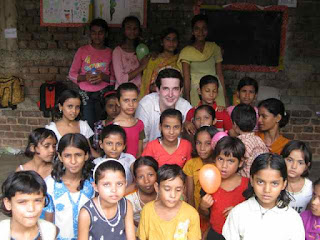
by Anuradha Bakshi | Aug 23, 2010 | women centre
 Volunteers are an intrinsic part of pwhy. They come from all corners of the world, from the most unexpected places: Senegal, Azerbaijan, Turkey, UK, USA, France, Spain, Singapore, Canada, Sweden. They have one common denominator: their love for project why and their conviction about our work. They spend a few days, a few weeks or even a few months and when they go, they leave a little of themselves in each one of us. They are undoubtedly a very important part of our success.
Volunteers are an intrinsic part of pwhy. They come from all corners of the world, from the most unexpected places: Senegal, Azerbaijan, Turkey, UK, USA, France, Spain, Singapore, Canada, Sweden. They have one common denominator: their love for project why and their conviction about our work. They spend a few days, a few weeks or even a few months and when they go, they leave a little of themselves in each one of us. They are undoubtedly a very important part of our success.
For the past four years now we have had volunteers from Cambridge University and this year it was Steve, better known as Steve Bhaiya!
I remember the day he landed in our world. It was incredibly hot and his flight was meant to land at 11 am so we expected him around 1pm. The plan was to have him wash up, have a cool drink and then send him to the women centre where we had planned to have him volunteer for the next two months. Steve arrived at my door at around 2pm. He had been stuck in traffic jams and was looking miserably hot. I was immediately charmed by his gentle and warm voice and his heartwarming smile. I asked him whether he wanted to rest or would be agreeable to go straight to work! He agreed to the later and hence began Steve’s tryst with our women centre.
Let us fast forward to two months later. Departure time has come. For the past week Steve has been trying to tell his students that he had to go back to his country and to say the least the news was far from welcome. The no, please dont’ go, stay here, when are you coming back abounded all expressed in the English Steve had painstakingly taught our primary students during two whole months. And every one’s feelings were summed up in Kajal’s words when she said: were are so grateful because that you all the way over from England just to help us. She somehow echoed what I would like to say to him.
You may ask what Steve did during these months. His meticulous blog gives an account of his weeks with us and I must confess I enjoyed reading it as it gave me a insight into our work seen through someone else’s eyes. I of course had only second hand knowledge of his work. As luck would have it, Steve came at a time when our spoken English teacher had taken long leave of absence and we were in a quandary about how we would manage. The pupils in question were those of classes II to V and a lively lot at that. But Steve was not one to be deterred and took the task head on. 128 primary kids divided in 4 groups was quite a handful for anyone but Steve did a super job. Everyone was impressed. I use to get bribes of the going ons either by our coordinator or by Steve himself. I was told about the small pranks, the occasional mischief and antics but also about the incredible progress the children made under Steve’s guidance. I was pleasantly surprised to learn that even the parents felt that their children were learning English. This was a huge moment for me as how could I forget the very first words uttered to me well before it all began: teach our children English. It had taken a young college rugby player and stellar student to do that. Hats off to him.
But there was another side of Steve, one I have the privilege to be privy to quite inadvertently. It was a Saturday morning and Steve’s day off. We on the other hand were all set to take little Manisha to boarding school. We had all gathered in the kitchen of my home and were waiting for the car when Steve came down for a late breakfast. On hearing that we were off to the boarding school he decided to come along, breakfast forgotten. It was a memorable day in more ways than one. Steve truly liked the school and was even treated to a spot of colonial spin off as he was feted by the house master who fell backwards to please him. We all had a merry laugh though in hindsight Steve felt a little sheepish. That day I saw another side of Steve one that I can only sum up with a reference to my favourite book the Little Prince: Steve knew the fox’s secret and saw with his heart. In the weeks to come Steve was to visit the boarding school twice: once on PTM day, and on Independence Day where he was even seated on the VVIP sofa! Each time was special for him and us.
During his two months with us, I have had the occasion to share my thoughts, dreams, fears, angst and more with Steve. He always listened and strangely made me feel better as he managed to chase my blues and fill me with quiet optimism. I deeply value the moments we spent together.
Soon Steve will leave India leaving fond memories in our hearts. The children will stay in touch thanks to the web camera he gave them as a parting gift. I, on the other hand will find myself browsing photographs and remembering this very special volunteer.
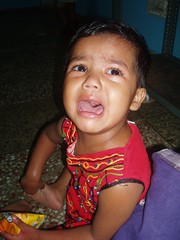
by Anuradha Bakshi | Jul 21, 2010 | commonwealth games, women centre
 A young man came by recently. His dream: to make a difference. His vision: to help eradicate hunger by feeding the poor. His reason: hunger hampers every aspect of growth and development. One could only but agree. In the recent report on the Commonwealth Games, published by Habitat International Coalition and aptly entitled whose wealth- whose commons, we find some startling data: 40 % of the world’s starvation-affected people live in India, 76% families (840 million) people do not get their daily required calories, 55 % of India’s women are malnourished, 46% of India’s children are malnourished, more than 320 million people in India are unable to manage three square meals a day and the most startling one: more than 5,000 children die every day from malnourishment. So hunger is a huge issue and needs to be addressed.
A young man came by recently. His dream: to make a difference. His vision: to help eradicate hunger by feeding the poor. His reason: hunger hampers every aspect of growth and development. One could only but agree. In the recent report on the Commonwealth Games, published by Habitat International Coalition and aptly entitled whose wealth- whose commons, we find some startling data: 40 % of the world’s starvation-affected people live in India, 76% families (840 million) people do not get their daily required calories, 55 % of India’s women are malnourished, 46% of India’s children are malnourished, more than 320 million people in India are unable to manage three square meals a day and the most startling one: more than 5,000 children die every day from malnourishment. So hunger is a huge issue and needs to be addressed.
And yet when the passionate young man came to me, I found myself trying to almost dissuade him from his mission, or at least temper it. When we began, a decade ago, we too had a nutrition component in our programme. I remember the bananas and porridge we doled out every day. But after a some time we found that these were often being thrown away by the children who maybe got bored of these items. And how can I forget the irate mother who came screaming that the banana given to her child was rotten! Anyway, we soon stopped the programme seeing that it was getting nowhere.
In spite of the stark reality and need of addressing the hunger issue, feeding the poor is no easy task. We simply zeroed in on education knowing somehow intuitively that this was the way to go.
I have often written about the wastage of food I have seen in the slums of Delhi. It is almost as if throwing food was a way to prove that you had arrived! And yet as I said earlier hunger is a sad reality and needs to be addressed. No child should be allowed to die of hunger in any self respecting society. 5000 do. Yet, if all was well, this should not be happening. In 1975, India launched the Integrated Child Development Scheme (ICDS). It was heralded as India’s response to the challenge of providing pre-school education on one hand and breaking the vicious cycle of malnutrition, morbidity and mortality on the other and was to reach all the children in India. Huge funds were disbursed and had the programme worked no child should have been hungry. But that was not to be. As all else in India, the funds were hijacked along the way with impunity to line pockets of politicians and bureaucrats. Come to think of it India is replete with fabulous social schemes that could make all the difference but never do as they simply become ways of enriching wily individuals. I have always held that even if these schemes had been half successful, India would be a different land.
Even today a shocking story was aired on national television. Food meant for children is being eaten by dogs! The reason: lack of storage facility. 50 million people in the state need the food, but bad planning has meant that dogs will eat it! I wonder why sufficient silos and storage facilities cannot be built, it would be better use of public money than beautifying cities for games extravaganzas! But then existent silos are used for stocking, hold your breath, booze!
One can open soup kitchens galore but they will never bring about the change we seek. Change will only come when we break free of the vicious cycle of corruption in which we are all held. Media helps, activism helps but these are simply band-aid remedies. We need to stem the rot and that can only happen when the poor are give a voice. And education is the only answer. Today the beneficiaries of social programmes are unaware of their existence or see them not as a right but as an act of largesse handed out by a local politico. You see we are still a feudal society where the erstwhile landlord has been replaced by the devious politician and the scheming official.
Change will only come when every beneficiary will be empowered enough to ask for his due and seek accountability, and the key is education. But that is the one thing the powers that be do not want. No, don’t be surprised and read on.
Public education is in shambles and the princely pass percentage of 33%, prescribed by the State makes sure that no one from the lower end of the scale gets any proper education. Let me share an incident that occurred a few years back. At that time we use to teach in a reclaimed pig park under a huge tent.One fine morning a posse of officials came and told us to vacate the park. We soon found out that the authorities had decided to build a toilet block in what was once a children’s park. We decided to protest and went to see the local Municipal Councilor. He is semi literate. He brandished a paper shouting that it was not a toilet block that was coming up there but a community centre. Raju, one of our class XI students looked at the paper and pointed out that it said public conveniences and that this meant toilets. You see Raju could reach English and the Councilor could not. From that day on I was branded enemy no 1 (apt title for a Bollywood blockbuster). The reason: I was committing the cardinal sin of empowering the poor and giving them a voice. In today’s India you did not do that. The poor had to remain where they were.
But only if we do empower the poor can we bring about the change we seek. That was the message I was trying to give my young friend!
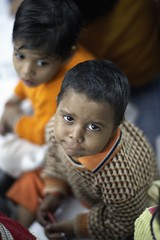
by Anuradha Bakshi | Jun 12, 2010 | women centre
 When I suggested that we begin environment awareness classes with the tiny tots of pwhy, many were sceptical but when Ma’am decrees what can you say! So the classes begun. Every day for about a quarter of an hour the creche kids were told about why water should not be wasted, why plastic was bad for our planet, why trees were needed and so on. Slowly the initially reluctant teachers got motivated and the children were told what to do in case they saw something that was not right. For instance, they if they saw a tap leaking, the teacher suggested they tell an adult and ensure that the tap was closed properly.
When I suggested that we begin environment awareness classes with the tiny tots of pwhy, many were sceptical but when Ma’am decrees what can you say! So the classes begun. Every day for about a quarter of an hour the creche kids were told about why water should not be wasted, why plastic was bad for our planet, why trees were needed and so on. Slowly the initially reluctant teachers got motivated and the children were told what to do in case they saw something that was not right. For instance, they if they saw a tap leaking, the teacher suggested they tell an adult and ensure that the tap was closed properly.
The children listened as they always do, with great concentration. Yet one wondered how much they really imbibed. I was confident that their little brains did process things and that time would tell whether I had been right or not.
Imagine my joy when our creche in charge told me that little Raj, all of 3 years had become a little water warrior. She recounted how a few days back he had gone to the bathroom and come back all agitated mumbling ‘water leak’ ‘water leak’ and tugging at the teacher’s kurta. At first she did not understand what it was all about and even chided him. But Raj did not let go and pulled her pointing towards the bathroom. The teacher followed him and found him showing her the tap that was dribbling a little. She closed it tightly and Raj all smiles clapped in delight. Since that day Raj never fails to point out a leaking tap if he sees one. I wonder whether he does the same at home.
Children are very receptive to such matters. At the women centre we now have quite a few water warriors who have evolved their own ways to save water. Some days back there was just half a can of drinking water left in the centre. Actually our coordinator had hidden the rest as he was irked at the children who threw as much as they drank as they fooled around or spent large amounts of clean drinking water washing the glass after each use. So that day there was no water to drink. When the children asked for water to drink, they were simply told there was none left because it has been wasted unnecessarily. The day was very hot and the children thirsty. The children went back to their class. When it was time to go home, they did not leave but spent time discussing the water issue. Some time later they came to the coordinator and told him they had found a solution. They asked the coordinator to stop allowing children to come and drink at any time but to begin water breaks when all those who needed a drink would go to where the drinking water cans were kept and have a drink.
The new ‘rule’ was adopted and from the next day the centre had drinking breaks. The children would come down and one of them would stand and supervise matters. Children had to drink without placing their lips on the glass so that one did not need to wash it each time, and the supervisor of the day was the one who filled each glass carefully, without any spill and ensured that everyone finished their glass. The system is now in place and works to perfection.
I have always held that change of any kind can only come if we include the smallest, the poorest and the less privileged as an equal partner. Once again I was proved right, or so I would like to believe.
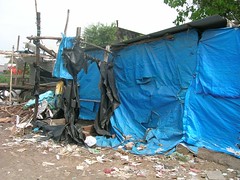
by Anuradha Bakshi | May 25, 2010 | okhla, women centre
 I recently came across an article about a ‘school’ in a garbage dump in Mumbai. The article is uncanny. It could have been written for us. It almost recounted the story of our Okhla centre, a story I had never written. It was time to make amends.
I recently came across an article about a ‘school’ in a garbage dump in Mumbai. The article is uncanny. It could have been written for us. It almost recounted the story of our Okhla centre, a story I had never written. It was time to make amends.
My mind travelled back to the summer of 2004 when one of our teachers came and told us about the plight of a bunch of kids that lived in the slums near her home. Most of them, particularly boys, were not in school and spent their time loitering and were used by predators to steal and push drugs. The are in question was close to a railway track and the little boys were trained to steal from stopped trains anything they could lay their hands off. Moreover the area was home to some notorious drug dealers and little children were easy prey. A few coins or the promise of a treat were enough to get the boys to comply. I was deeply disturbed by this and asked her whether we could begin an outreach centre. Unaware of the lay of the ground, I asked her to find us a room to rent! She smiled and told me that barring factories and slums there was nothing else. I refused to accept easy defeat and requested her to look for something.
A few days later, she came back and said that there was a garbage dump that we could use. These were still early days of project why and I must admit teaching in a garbage dump was almost anathema but then children stealing and peddling drugs was a greater abomination. So I asked her to explore the possibilities. A few more days went by and she came back tome saying that she had talked to the local politicos and cops and got a tacit nod from them with a proviso: that we would move lock, stock and barrel the day the space would be needed. I must add here that the dump we are talking about is ‘owned’ by the government. Beggars cannot be choosers and in this case the need was too great. It was time I visited the place.
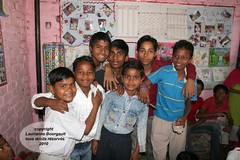 Nothing could have prepared me for what I saw, more so because I was supposedly looking at it with a view to set up a children’s centre. The place was filthy with layers and layers of garbage and along side there were a handful of ramshackle huts that housed mostly physically handicapped persons, who were all known to be drug peddlers. They looked scary to say the least. But the space that lay in front of my eyes was huge by our standards and had ‘potential’. There was no way we could clean the place. How do you clean years of filth. So the next best option was to dump earth on it. We had to get several truckloads. And then keeping in mind the caveat we had been served and had agreed to, we set up a flimsy structure made of bamboo and plastic sheets. And on a warm summer morning classes began. It was June 2004 exactly six years ago!
Nothing could have prepared me for what I saw, more so because I was supposedly looking at it with a view to set up a children’s centre. The place was filthy with layers and layers of garbage and along side there were a handful of ramshackle huts that housed mostly physically handicapped persons, who were all known to be drug peddlers. They looked scary to say the least. But the space that lay in front of my eyes was huge by our standards and had ‘potential’. There was no way we could clean the place. How do you clean years of filth. So the next best option was to dump earth on it. We had to get several truckloads. And then keeping in mind the caveat we had been served and had agreed to, we set up a flimsy structure made of bamboo and plastic sheets. And on a warm summer morning classes began. It was June 2004 exactly six years ago!
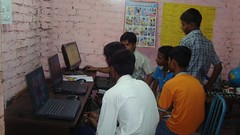 The Okhla story has been one of ups and downs, of elation and frustration. A true pwhy story. It was launched by two very special women, who weathered every storm that came their way. It is a story of strange encounters. It is a story of a bunch of children and their teachers defying every odd be the heat, or the unexpected storms. It is a story of grit, determination and above all triumph. Today Okhla has a secondary class and even a computer centre.
The Okhla story has been one of ups and downs, of elation and frustration. A true pwhy story. It was launched by two very special women, who weathered every storm that came their way. It is a story of strange encounters. It is a story of a bunch of children and their teachers defying every odd be the heat, or the unexpected storms. It is a story of grit, determination and above all triumph. Today Okhla has a secondary class and even a computer centre.
Above all it is the story of a magical garbage dump that metamorphosed into a vibrant space that conjures dreams and desires and makes them come true

 Memory is a way of holding on to the things you love, the things you are, the things you never want to lose wrote Kevin Arnold. I was reminded of these words yesterday when I finally mustered the courage to go and see what was left of the homes of my dear Lohar friends. Nothing could have prepared me for what I saw: a desolate stretch of road strewed with the last vestiges of what once was a vibrant and happy place.
Memory is a way of holding on to the things you love, the things you are, the things you never want to lose wrote Kevin Arnold. I was reminded of these words yesterday when I finally mustered the courage to go and see what was left of the homes of my dear Lohar friends. Nothing could have prepared me for what I saw: a desolate stretch of road strewed with the last vestiges of what once was a vibrant and happy place.











